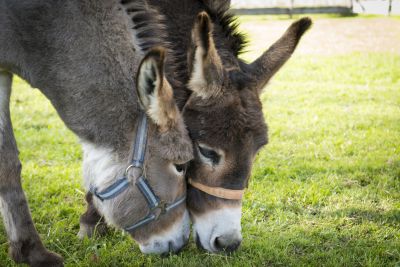













































Extensive research has revealed that mules are one of the best problem solvers amongst domestic animals.
The study is the result of collaboration between Dr Britta Osthaus of Canterbury Christ Church University and The Donkey Sanctuary, Devon. It looked at the ability of mules, donkeys and horses to problem solve to obtain a small food reward. The results were also compared with Dr Osthaus’ previous studies carried out on dogs.
During the tests, the animals needed to work out the shortest route through a gap past a barrier to get to a food reward. The position of the gap changed after a set number of repetitions meaning that the animals needed to re-evaluate their route. On the first detour task, mules were able to take the shortest route from the start point and head straight through without hesitation. Donkeys took slightly longer to solve the problem and horses longer still. After a change in the set-up mules and donkeys proved to be far more flexible than horses and dogs, who got stuck behind the barrier, not realising the gap had been moved.
The results proved that mules are as clever as dogs at problem solving and that they also show potential to ‘learn to learn’ – applying flexibility to their thoughts and actions in response to their environment. The study also demonstrated that mules and donkeys were significantly more flexible in their approach to problem solving than horses or dogs – debunking the common myth of these animals being ‘stubborn’.
Dr Britta Osthaus, Senior Lecturer in Applied Social Sciences has been researching animal behaviour for years, she said: “This experiment shows the problem-solving abilities of different species. Interestingly, and rather surprisingly, donkeys and mules are more flexible in their learning than horses and even dogs. This means there is a lot going on between those long ears. They are not stubborn: they stop and think. Experiments like this are important for animal welfare: the more we know what is going on in their heads, the better we can adjust our expectations and training methods.
“My previous research has shown that dogs can be rather stupid when facing a novel physical problem. We wanted to know whether other animals have the same problem – and as we can see, mules and donkeys are not as easily thrown as dogs.”
This study supports previous work carried out by the team which shows that mules not only demonstrate their ‘hybrid vigour’ physically but that this also extends to their intelligence.
The Donkey Sanctuary provides sanctuary to over 167 mules who have been rescued from neglect, abandoned or relinquished to the charity when their owners could no longer look after them. Mules are intelligent and very trainable; however they are careful and will not easily be over worked. Their instinct for self-preservation means they will not readily put themselves in danger, or be over-worked which has led to the misconception of stubbornness.
Dr Faith Burden who assisted with the study on behalf of The Donkey Sanctuary says: “All in all the study really backs up what we have all known but not been able to prove until now: donkeys and mules are thoughtful when presented with a problem and are accurate and fast learners. They certainly put their shorter eared cousins in the shade in this study.”
During International Donkey Week (8-13th May 2013), hundreds of visitors to The Donkey Sanctuary’s Devon Farms will be able to meet many of the rescued mules and learn more about these intelligent and fascinating animals.
Canterbury Christ Church University
Canterbury Christ Church University is a modern university with a particular strength in higher education for the public services.
With nearly 20,000 students, across Kent and Medway, its courses span a wide range of academic and professional subject areas.
*2010/11 Destination of Leavers from Higher Education survey
The Donkey Sanctuary
The Donkey Sanctuary was founded by the late Dr Elisabeth Svendsen M.B.E. in 1969. We support projects to alleviate the suffering of donkeys in 28 countries worldwide, including sanctuaries across Europe, where more than 15,000 donkeys and mules have been cared for, and major projects in Egypt, Ethiopia, India, Kenya and Mexico, where donkey welfare is improved through community education and veterinary work. We also provide donkey-assisted therapy for children and adults with additional needs which includes therapeutic visits to care homes in the local community from our centres in Belfast, Birmingham, Ivybridge, Leeds, Manchester and Sidmouth.
For further information telephone: 01395 578222, view www.thedonkeysanctuary.org.uk or visit the charity’s headquarters near Sidmouth in Devon (open 365 days/free admission).
For more information about The Donkey Sanctuary’s work, both in the UK and in 27 countries worldwide, please visit www.thedonkeysanctuary.org.uk
About Mules
Source: www.canterbury.ac.uk